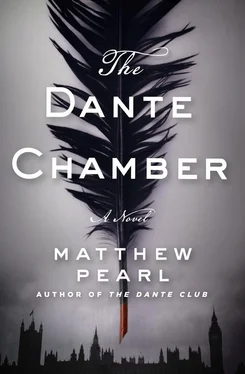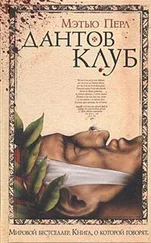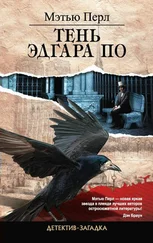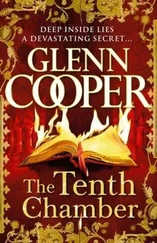I crown you a lord and bishop over yourself.
Amelia nodded with interest. “Mr. Browning was communicating with you through Dante. He was requesting your advice, your counsel. I remember you constantly reading Dante some years ago when — well, at a time Mother was so worried about you she confided in me that she wanted to take you away from Boston to Providence or to Manchester-by-the-Sea, or anywhere away from whatever was going on closer to home. Now you again read Dante late into the night.”
Holmes nodded. After Inspector Williamson and his assistant had announced the completion of their interview on the train, the detective had left behind the copy of Dante’s Purgatory on the seat. No purpose on earth could compel Holmes to renew the conversation with the detective by trying to return the book to him. But he also could not just abandon the volume there among the debris of newspapers and cigar stubs. Dante had become part of him, whether he liked it or not. He took the book with him.
If there was one trait of Dante’s that Holmes noticed every time he dared read him, it was bravery. Dante did not shy away from writing about bloodshed and violence; he converted it into beauty and poetry. He found meaning in the seeming cruelty and indifference of God’s ways. Holmes could never find meaning in violence and disease.
His years as a medical professor had pushed him even further away, it seemed, from life and from death. He could recall sitting in the courtroom when his friend and fellow Harvard professor Dr. John Webster was being tried for murder. Such an extravagant proposition , the defense counsel told the jury, why, we might as well suppose Dr. Holmes committed a murder!
Holmes didn’t know whether to laugh along with the rest of the courtroom or object (as if he had standing to do so).
I can see well enough that you couldn’t help hunt a murderer.
“Whenever Dante’s name came up,” Amelia continued, “you always told me that Dante managed the improbable, to be a poet and a man in equal parts of his soul. I may not be a scholar of Dante, but I know there must be something you could do, Father, to banish whatever eats at you.”
“The great thing in this world, my dear ’Melia, is not so much where we stand, but the direction we are moving. Thank you.”
Holmes embraced her, giving her instructions and letters of introduction for the remainder of the European tour. Upon returning above, he found a porter and filled the palm of one of his hands with coins to bring Holmes and his trunks to the first train to London straightaway — and arrange a cab to meet him at the other end ready to drive to the home of Robert Browning.
Browning peered down from the large casement window as he soothed himself with a taste from his glass. He looked out at the tangle of chimneys and spires, the brickwork and woodwork of the other houses, attempts to keep the world out and the warmth in. He hoped he’d catch sight of Christina. He was more than anxious to hear what she’d say they should do now. Though he’d been the one to try to calm her in their initial meeting at Tudor House, as they had descended into the mysteries of her brother she proved to be the comforting force between the two of them.
The latest edition of one of the London newspapers was nearby, and he caught a glimpse of the society column. Oliver Wendell Holmes, expected as a guest to literary and medical luminaries in London, has regretfully called off his visit to the city due to conflicts of schedule ... Browning tossed the paper away in frustration before he’d feel compelled to curse the selfish Holmes — who never replied to his telegram — or to read the latest crime columns again.
He steeled himself — their inquires would intensify with the news of another murder. He withdrew from as many of his social obligations as he could. There was one dinner in his honor he could not avoid, which he had attended the prior evening. Since the publication of Browning’s four-volume murder poem The Ring and the Book , the degree of “Browningolatry,” as his son called it, had increased manifold. People still criticized him for the poem’s length and complexity, but they celebrated the narrative and the travails of the characters — to him, the least interesting and important parts.
What readers enjoyed most was what he was unmoved by; and what his ambitions thrived upon, a bold and metaphysical intricacy, left readers cold. “Childe Roland” came to him in a dream, with hardly any thought, and readers adored it. One thing he knew he couldn’t do was alter himself. It turned out success wasn’t something to achieve for Browning, it was something to conquer.
“Why not make it easy to read your verse?” a young man once asked him.
It wasn’t that he tried to make his writing obscure. But he never pretended to offer literature as a substitute for a cigar, or a game of dominoes, to an idle man. He wasn’t about to be Walt Whitman.
He had not planned on staying at the dinner long, and while the other men gossiped and traded amusing stories, Browning’s mind wandered to Christina, to Dante Alighieri, to Gabriel. That literary gadfly John Forster was present, and seemed to sense Browning’s distraction. He was the last person on earth Browning wanted to be near. Forster thrived on rudeness and felt he earned the right to say anything to Browning by publishing a laudatory review of his poems some thirty-odd years earlier. For the most part, Forster’s close friendship with Dickens protected him from any repercussions for his behavior. The Dickens camp detested Gabriel Rossetti, too, the great novelist having declared the unorthodox art produced by Gabriel’s Pre-Raphaelite Brotherhood at turns mean, odious, repulsive , and revolting .
It didn’t take long at the dinner for Forster to target Browning. Forster mentioned that he had heard Browning had been seen often lately with Christina Rossetti. “I am glad to hear it, Browning,” Forster continued, his jowls shaking with delight. “She was never as homely as her clothing. Perhaps Saint Christina has realized, albeit later than the rest of women her age in London, that she can do better than a barren life sputtering out verses as a vestal virgin — oh, but is she still? ”
Browning felt the rage rush to his face.
“Dare to say another word in disparagement of that lady,” he roared, “and I will pitch this into your head!” Browning lifted a heavy glass decanter over his shoulder.
It was almost comical how the whole table of diners encircled Browning — as though it would take six men to stop the poet from throwing the decanter of claret — while the pale and trembling Forster retreated to the next room under guard of a magazine critic and a playwright, planning out his complaints about it to Dickens.
Browning would never tell Christina what Forster had said. Not because he thought her overly sensitive, but because he knew how strong she was, and she did not deserve to hear insults from one who didn’t understand her and never would. What many saw as her aloof languidness, he knew was serious observation of the world. What people believed was inflexible religiosity, he’d sensed contained a potent and unusual spirituality. What others thought her stilted cultivation in conversation, he knew held gentle wryness ready to be sprung on any unsuspecting pretentiousness. In the throes of what she felt passionate about — her family, for one — she became animated and alive, and Browning saw beauty where others didn’t, as he had with Ba.
Now Browning scanned the street below his window. He removed his watch from his vest pocket. On the watch chain was also Ba’s ring. It looked so small . Rather than reminding him of her, it made her seem unreal, as if no individual such as Elizabeth Barrett Browning ever existed. Nine years after her death, he was no longer unhappy, exactly, when thinking about Ba. He was resigned. An even worse feeling.
Читать дальше












